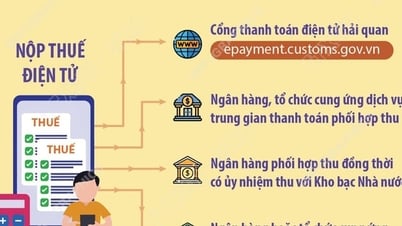Ms. Ngan also wants to know, can businesses in Vietnam use this invoice and just keep the PDF version, without needing a paper copy with a fresh signature?
In case a foreign enterprise issues an invoice, sends a PDF version using an electronic signature to a Vietnamese enterprise and this electronic signature is authenticated by an organization in that country (equivalent to a specialized electronic signature that is guaranteed, a digital signature in Vietnam), can the Vietnamese enterprise use this invoice and only need to keep the PDF version?
According to Articles 10, 23, 25, 26 of the Law on Electronic Transactions, Ms. Ngan's enterprise understands that, in the case of transactions with foreign partners, in order for the foreign partner's electronic signature to comply with the above provisions, the partner must register the electronic signature with the Ministry of Science and Technology , only then will it be considered to have the same legal value as a paper copy. Ms. Ngan asked, is her enterprise's understanding correct?
According to Article 27 of the Law on Electronic Transactions, foreign electronic signatures and foreign electronic signature certificates accepted in international transactions are foreign electronic signatures and foreign electronic signature certificates of foreign organizations and individuals not present in Vietnam, valid on data messages sent to Vietnamese organizations and individuals.
Ms. Ngan asked, does "not present in Vietnam" here have to comply with the definition in the investment and trade law? If so, then in the case of a foreign enterprise having a presence in Vietnam in the form of a representative office, capital investment..., is the regulation under Article 27 above applicable?
Regarding this issue, the Ministry of Science and Technology responded as follows:
Article 10 of the Law on Electronic Transactions stipulates the requirements for data messages to have the same value as the original:
"1. The information in a data message is guaranteed to be intact from the time it is first generated as a complete data message.
Information in a data message is considered intact when it has not been changed, except for changes in form that arise during the process of sending, storing or displaying the data message.
2. The information in the data message is accessible and usable in its complete form".
A data message which complies with the provisions of Article 10 shall have the same value as the original.
The Law on Electronic Transactions stipulates that an electronic signature is a signature created in the form of electronic data attached or logically combined with a data message to confirm the signing subject and affirm that subject's acceptance of the data message.
The use of electronic signatures by Vietnamese enterprises (invoices in PDF format and signing on PDF files by dragging and dropping signature images) are other forms of confirmation by electronic means that are not electronic signatures. This does not ensure compliance with the provisions of Article 10 of the Law on Electronic Transactions.
Article 13 of the Law on Electronic Transactions stipulates that in cases where the law requires storage, it can be stored in the form of data messages when meeting the requirements in Clause 1, Article 13 of the Law on Electronic Transactions; in cases where the law provides otherwise, organizations and individuals may choose to store them in the form of paper documents or store them in the form of data messages.
Foreign partners are not required to register electronic signatures in Vietnam.
"According to Articles 10, 23, 25, 26 of the Law on Electronic Transactions, Ms. Ngan's enterprise understands that, in the case of transactions with foreign partners, in order for the foreign partner's electronic signature to comply with the above provisions, the partner must register the electronic signature with the Ministry of Science and Technology, only then will it be considered to have the same legal value as a paper copy."
The above understanding is not quite correct, in international transactions, the parties can agree on the use of foreign electronic signatures or foreign electronic signature certificates. Accordingly, Article 27 of the Law on Electronic Transactions stipulates that foreign electronic signatures and foreign electronic signature certificates are accepted as foreign electronic signatures and foreign electronic signature certificates of foreign organizations and individuals not present in Vietnam, effective on data messages sent to Vietnamese organizations and individuals; organizations and individuals choose and are responsible for accepting
Therefore, there is no need to register with the Ministry of Science and Technology unless required.
The concept of "not present in Vietnam" has been specifically regulated in the laws on investment, trade and enterprises, and is understood and applied generally except in cases where the Law on Electronic Transactions provides otherwise. The Law on Electronic Transactions does not have any regulations on this concept. Therefore, the concept is applied according to the laws on investment, trade and enterprises.
In case a foreign enterprise has a presence in Vietnam under the law on commerce and enterprises, the foreign electronic signature of this enterprise will not be subject to the provisions of Clause 1, Article 27 of the Law on Electronic Transactions.
Chinhphu.vn
Source: https://baochinhphu.vn/khi-nao-van-ban-co-chu-ky-eien-tu-duoc-coi-nhu-ban-goc-102250929115014287.htm



![[Photo] National Assembly Chairman Tran Thanh Man chairs the 8th Conference of full-time National Assembly deputies](https://vphoto.vietnam.vn/thumb/1200x675/vietnam/resource/IMAGE/2025/9/29/2c21459bc38d44ffaacd679ab9a0477c)
![[Photo] Many streets in Hanoi were flooded due to the effects of storm Bualoi](https://vphoto.vietnam.vn/thumb/1200x675/vietnam/resource/IMAGE/2025/9/29/18b658aa0fa2495c927ade4bbe0096df)
![[Photo] General Secretary To Lam attends the ceremony to celebrate the 80th anniversary of the post and telecommunications sector and the 66th anniversary of the science and technology sector.](https://vphoto.vietnam.vn/thumb/1200x675/vietnam/resource/IMAGE/2025/9/29/8e86b39b8fe44121a2b14a031f4cef46)
![[Photo] General Secretary To Lam receives US Ambassador to Vietnam Marc Knapper](https://vphoto.vietnam.vn/thumb/1200x675/vietnam/resource/IMAGE/2025/9/29/c8fd0761aa184da7814aee57d87c49b3)

































































































Comment (0)